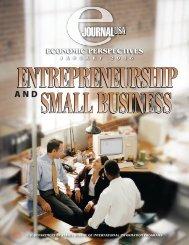s. history us history us history - Embassy of the United States
s. history us history us history - Embassy of the United States
s. history us history us history - Embassy of the United States
- No tags were found...
Create successful ePaper yourself
Turn your PDF publications into a flip-book with our unique Google optimized e-Paper software.
CHAPTER 15: BRIDGE TO THE 21ST CENTURYOUTLINE OF U.S. HISTORYing <strong>the</strong> presidential campaign, hesubmitted to Congress a budgetcalling for a general tax increase.It originally included a wide taxon energy consumption designedto promote conservation, but thatwas quickly replaced by a nominalincrease in <strong>the</strong> federal gasolinetax. It also taxed social securitybenefits for recipients <strong>of</strong> moderateincome and above. The big emphasis,however, was on increasing <strong>the</strong>income tax for high earners. Thesubsequent debate amounted to arerun <strong>of</strong> <strong>the</strong> arguments betweentax cutters and advocates <strong>of</strong> “fiscalresponsibility” that had marked <strong>the</strong>Reagan years. In <strong>the</strong> end, Clintongot his way, but very narrowly. Thetax bill passed <strong>the</strong> Ho<strong>us</strong>e <strong>of</strong> Representativesby only one vote.By <strong>the</strong>n, <strong>the</strong> congressional electioncampaigns <strong>of</strong> 1994 were underway. Although <strong>the</strong> administrationalready had made numero<strong>us</strong> foreignpolicy decisions, issues at home wereclearly most important to <strong>the</strong> voters.The Republicans depicted Clintonand <strong>the</strong> Democrats as unreformedtax and spenders. Clinton himselfwas already beleaguered with charges<strong>of</strong> past financial impropriety inan Arkansas real estate project andnew claims <strong>of</strong> sexual impropriety. InNovember, <strong>the</strong> voters gave <strong>the</strong> Republicanscontrol <strong>of</strong> both ho<strong>us</strong>es <strong>of</strong>Congress for <strong>the</strong> first time since <strong>the</strong>election <strong>of</strong> 1952. Many observers believedthat Bill Clinton would likelybe a one-term president. Apparentlymaking a decision to conform tonew political realities, Clinton insteadmoderated his political course.Policy initiatives for <strong>the</strong> remainder<strong>of</strong> his presidency were few. Contraryto Republican predictions <strong>of</strong> doom,<strong>the</strong> tax increases <strong>of</strong> 1993 did not getin <strong>the</strong> way <strong>of</strong> a steadily improvingeconomy.The new Republican leadershipin <strong>the</strong> Ho<strong>us</strong>e <strong>of</strong> Representatives, bycontrast, pressed hard to achieveits policy objectives, a sharp contrastwith <strong>the</strong> administration’s newmoderate tone. When right-wingextremists bombed an OklahomaCity federal building in April 1995,Clinton responded with a tone <strong>of</strong>moderation and healing that heightenedhis stature and implicitly leftsome doubts about his conservativeopponents. At <strong>the</strong> end <strong>of</strong> <strong>the</strong> year,he vetoed a Republican budget bill,shutting down <strong>the</strong> government forweeks. Most <strong>of</strong> <strong>the</strong> public seemed toblame <strong>the</strong> Republicans.The president also co-opted part<strong>of</strong> <strong>the</strong> Republican program. In hisState <strong>of</strong> <strong>the</strong> Union address <strong>of</strong> January1996, he ostentatio<strong>us</strong>ly declared,“The era <strong>of</strong> big government is over.”That summer, on <strong>the</strong> eve <strong>of</strong> <strong>the</strong>presidential campaign, he signed amajor welfare reform bill that wasessentially a Republican product.Designed to end permanent supportfor most welfare recipients andmove <strong>the</strong>m to work, it was opposedby many in his own party. By andlarge, it would prove successful inoperation over <strong>the</strong> next decade.THE AMERICAN ECONOMYIN THE 1990SBy <strong>the</strong> mid-1990s, <strong>the</strong> countryhad not simply recovered from <strong>the</strong>brief, but sharp, recession <strong>of</strong> <strong>the</strong>B<strong>us</strong>h presidency. It was entering anera <strong>of</strong> booming prosperity, and doingso despite <strong>the</strong> decline <strong>of</strong> its traditionalind<strong>us</strong>trial base. Probably <strong>the</strong>major force behind this new growthwas <strong>the</strong> blossoming <strong>of</strong> <strong>the</strong> personalcomputer (PC).Less than 20 years after its introduction,<strong>the</strong> PC had become afamiliar item, not simply in b<strong>us</strong>iness<strong>of</strong>fices <strong>of</strong> all types, but in homesthroughout America. Vastly morepowerful than anyone could haveimagined two decades earlier, ableto store enormo<strong>us</strong> amounts <strong>of</strong> data,available at <strong>the</strong> cost <strong>of</strong> a good refrigerator,it became a common appliancein American homes.Employing prepackaged s<strong>of</strong>tware,people <strong>us</strong>ed it for bookkeeping,word processing, or as a depositoryfor m<strong>us</strong>ic, photos, and video.The rise <strong>of</strong> <strong>the</strong> Internet, which grewout <strong>of</strong> a previo<strong>us</strong>ly closed defensedata network, provided access toinformation <strong>of</strong> all sorts, created newshopping opportunities, and establishede-mail as a common mode<strong>of</strong> communication. The popularity<strong>of</strong> <strong>the</strong> mobile phone created a hugenew ind<strong>us</strong>try that cross-fertilizedwith <strong>the</strong> PC.Instant communication andlightning-fast data manipulationspeeded up <strong>the</strong> tempo <strong>of</strong> many b<strong>us</strong>inesses,greatly enhancing productivityand creating new opportunitiesfor pr<strong>of</strong>it. Fledgling ind<strong>us</strong>tries thatfed demand for <strong>the</strong> new equipmentbecame multi-billion-dollar companiesalmost overnight, creatingan enormo<strong>us</strong> new middle class <strong>of</strong>s<strong>of</strong>tware technicians, managers, andpublicists.A final impet<strong>us</strong> was <strong>the</strong> turn <strong>of</strong><strong>the</strong> millennium. A huge p<strong>us</strong>h to upgradeoutdated computing equipmentthat might not recognize <strong>the</strong>year 2000 brought data technologyspending to a peak.These developments began totake shape during Clinton’s firstterm. By <strong>the</strong> end <strong>of</strong> his second one<strong>the</strong>y were fueling a surging economy.When he had been electedpresident, unemployment was at 7.4percent. When he stood for re-electionin 1996, it was at 5.4 percent.When voters went to <strong>the</strong> polls tochoose his successor in November2000, it was 3.9 percent. In manyplaces, <strong>the</strong> issue was less one <strong>of</strong> takingcare <strong>of</strong> <strong>the</strong> jobless than <strong>of</strong> findingemployable workers.No less a figure than FederalReserve Chairman Alan Greenspanviewed a rapidly escalating stockmarket with concern and warned<strong>of</strong> “irrational exuberance.” Investorexuberance, at its greatest since <strong>the</strong>1920s, continued in <strong>the</strong> convictionthat ordinary standards <strong>of</strong> valuationhad been rendered obsoleteby a “new economy” with unlimitedpotential. The good times wererolling dangero<strong>us</strong>ly fast, but most326327












